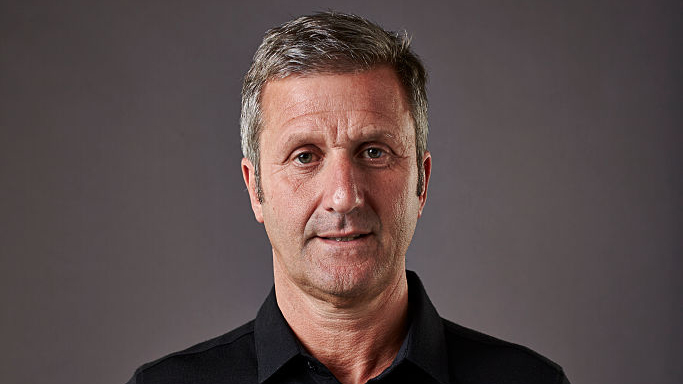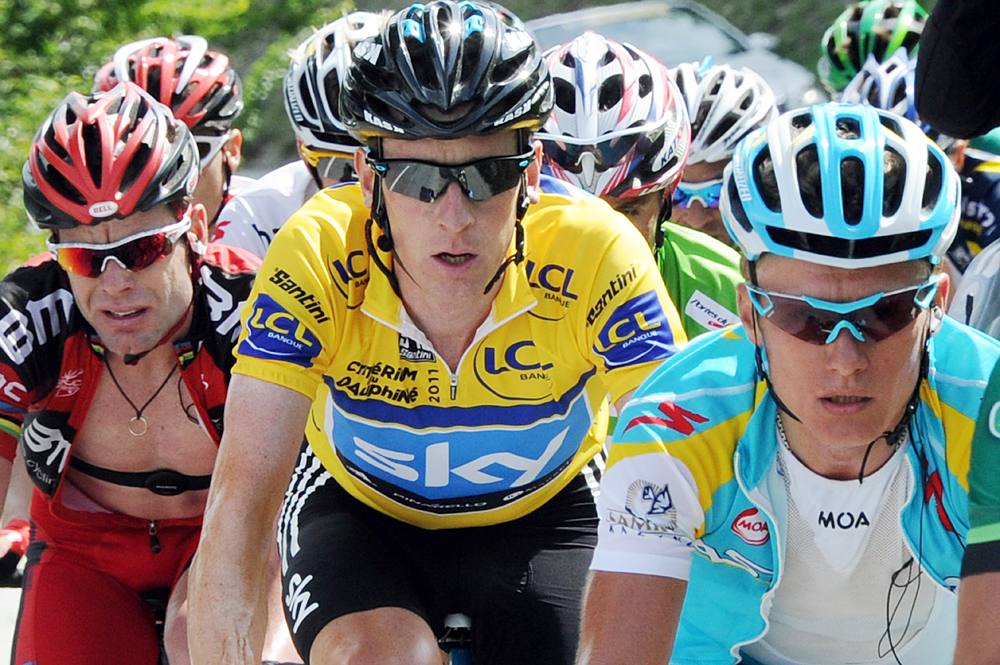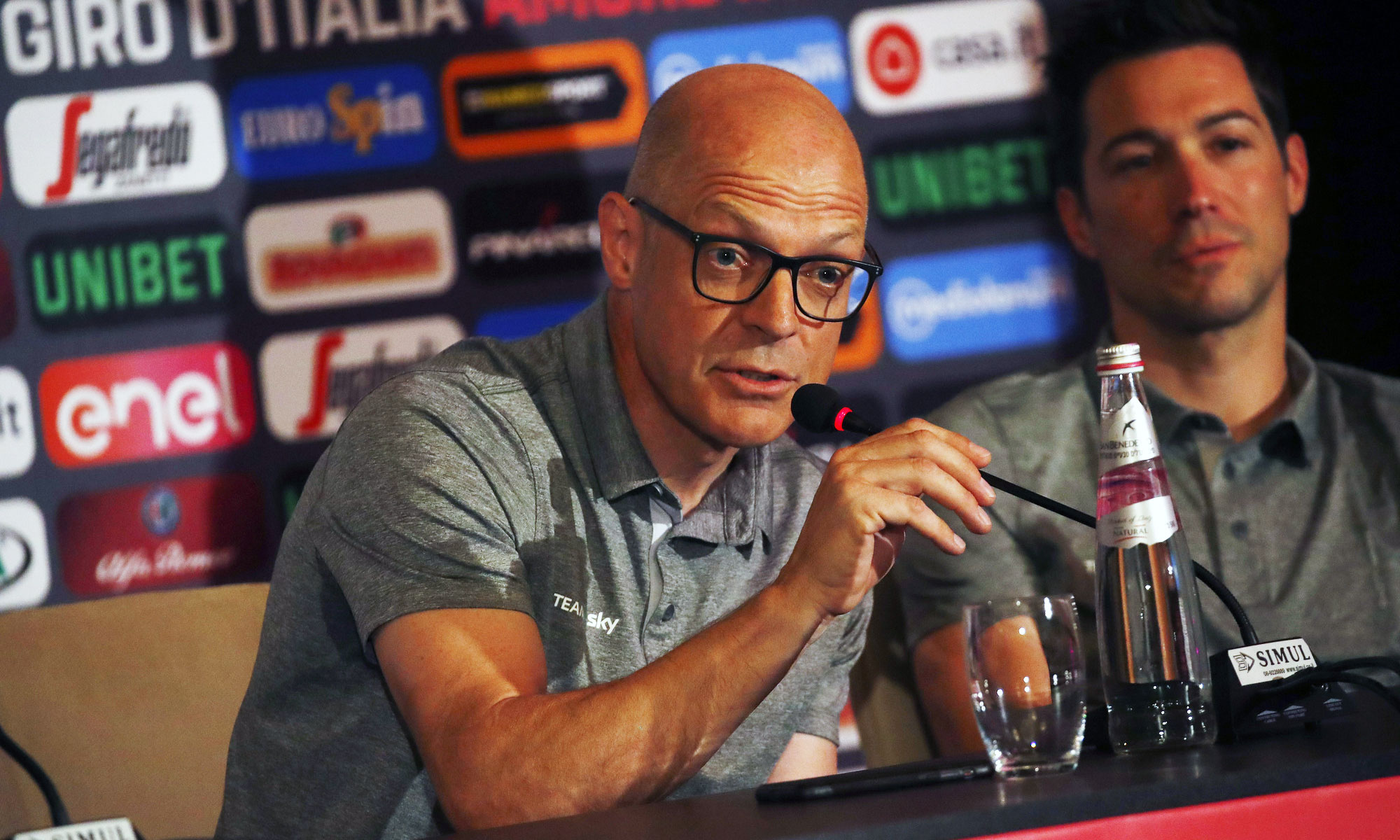Freeman denies crossing the line in treating Bradley Wiggins and Team Sky riders
Former Team Sky doctor had 'suicidal thoughts'



Former Team Sky doctor Richard Freeman has broken the silence he has held since the so-called 'jiffy bag' affair broke in October 2016, and has denied that any treatments he prescribed were intended for performance enhancement. Freeman admitted to ordering the delivery of a medical resupply, and to treating Bradley Wiggins at the 2011 Criterium du Dauphine, but insisted that the package received from Simon Cope contained the decongestant Fluimucil, as Sky principal Dave Brailsford testified before a Parliamentary select committee.
Timeline of UKAD investigation into Team Sky and British Cycling
Cope and Freeman asked to appear in front of doping inquiry
Bradley Wiggins doctor pulls out of anti-doping select hearing due to illness
Team Sky doctor previously bought Fluimucil from Swiss pharmacy
Richard Freeman resigns from British Cycling
Former Team Sky doctor lifts the lid on team's medical practices and grey areas
Team Sky 'Jiffy bag' doctor defends publishing book before Tour de France
When asked by BBC journalist Dan Roan about the 'jiffy bag', Freeman stated it contained "Fluimucil nebules". Why he didn't simply buy the medication in France, Freeman added, "Fluimucil nebulised solution isn't available in France on prescription. It's made in Switzerland, and they don't sell it in France... so I could not physically buy it in France, with or without a prescription. The confusion is the effervescent powder which is used to treat the common cold is available over the counter throughout Europe and is popular."
Freeman told the BBC that he did not give Wiggins any medication on the bus after the Dauphine, as was alleged. "I was administering fluimucil to Bradley, and obviously I can't say about other riders but you can imagine that one rider may not have been the only rider, throughout the race of the Dauphine and then I administered it again when we got to the training camp in Sestriere. I did not administer anything to Sir Bradley Wiggins on the bus at the Dauphine after the race."
The delivery of a package from Manchester by Simon Cope to Team Sky for Wiggins came under investigation by UKAD soon after Russian hackers made public Wiggins' Therapeutic Use Exemption applications that included one from June 29, 2011 - two weeks after the finish of the race - for an intramuscular injection of 40mg of Triamcinolone acetonide, a powerful steroids Wiggins says was to treat bad allergies.
- Full transcript of BBC interview with Dr. Richard Freeman
- Timeline of UKAD investigation into Team Sky and British Cycling
- Wiggins and Team Sky face fresh scrutiny over medical package
- Cope and Freeman asked to appear in front of doping inquiry
- Bradley Wiggins doctor pulls out of anti-doping select hearing due to illness
There was an accusation that the jiffy back contained triamcinolone, a point Freeman flatly denied. He also questioned the motivations of whomever sparked UKAD's investigation into the package, which went on for more than a year before being dropped without any anti-doping rule violations being issued.
The House of Commons Digital, Culture, Media and Sport Committee's report on 'Combating Doping in Sport', however, contained scathing criticisms of Team Sky and British Cycling and led to sweeping changes in the Federation's leadership and practices.
Get The Leadout Newsletter
The latest race content, interviews, features, reviews and expert buying guides, direct to your inbox!
"I'd like somebody to find out [why the delivery was reported] because it has caused damage. I don't believe it was to cause damage to me, I'm just the doctor. I'm a member of the support squad, I don't have a knighthood. Was it to damage Sir Bradley Wiggins? Was it to damage Sir Dave Brailsford? I think that's more likely. But why? I have no idea. And I look to journalists, I look to the DCMS, to find this out but I haven't got any answers."
Freeman still could not provide physical evidence that the package contained Fluimucil, as his records from the race were only kept on a laptop that was subsequently stolen. He told the BBC that the package was sent by British Cycling's Phil Burt, but both he and Cope testified they did not know the contents of the package.
"Phil Burt, who incidentally has a degree in pharmacology and knows a lot about medication - put the medication in the package, and sent it to me. Bradley Wiggins didn't know what was coming, Sir Dave Brailsford didn't know, why should they? That was a medical resupply, which wasn't unusual. Virtually every race I've been to I've had a medical resupply because the box that's arrived to me hasn't been restocked properly, someone's forgotten to add something. We were a logistics company as well as a medical department," Freeman said.
After the story broke in 2016, Brailsford inaccurately stated that Simon Cope had travelled to France for Emma Pooley, but it quickly became clear that Pooley had been in Spain at the time. Freeman says the falsehood was a mistake that Brailsford failed to check. "I believe it was Rod [Ellingsworth] that made the mistake… that's my interpretation."
Freeman said it was "very realistic" that none of the parties involved could recall what the contents of the delivery in 2011 were. "We sent so many packages of medicine," he said. "We started recording them in 2012, and between 2012 and 2014 over 275 medications were sent overseas, and when you ask somebody six or seven years later what was in the package for that particular race, it's unsurprising. However, Phil Burt is a very intelligent man - he knows a lot about pharmacology and for goodness sake he would not send anything out that he felt uncomfortable with."
Team Sky has always denied any wrongdoing or ethical violations and responded to the BBC interview stating, "These historical matters from 2011 have been the subject of extensive scrutiny and we have nothing further to add. All of our focus is on the Tour de France which starts on 7 July."
Breakdown
Freeman was called upon to testify in front of the Select Committee in January 2017, but he declined to appear for medical reasons. He revealed in the interview with the BBC that he suffers from depression, and the stress of the incident led him to have suicidal thoughts.
"I found the stress of this investigation, initially by the newspapers and then by UKAD very, very stressful and I don't think I want to talk a lot about it, but I think I say in my book it's something that we have to talk about. I suffered from a major depressive illness," Freeman said.
"I'm still receiving medical care and I've got a great deal of thanks to my consultant doctor. I went down to the select committee the day before but that's when unfortunately I had what the layman would call a breakdown, and it was the final straw. I did apologise to [committee chairman] Damian Collins and said when I was well I'd give oral evidence. I did also say that if I was able I'd give written evidence and I did actually give that, there are nine pages which is published."
In retrospect, Freeman said he should have told Team Sky or British Cycling about his condition. "I didn't tell anybody at either Team Sky or BC how I was feeling, I was just trying to cope, and then suddenly the final straw, and the final straw was actually going down to London before the House of Commons Select Committee."
But he said the stress was not the result of feeling guilty for any of his actions, or feelings of betrayal.
"Neither of those, it was just a combination of mental stress, mental fatigue. At the time I didn't feel as if I was being hung out to dry and I still don't feel that I'm guilty."
Having recovered, Freeman has used his time to write a book called The Line which he says has "some very important messages I want to get across ... particularly that pro sport is unhealthy, and this is to help the amateur understand how to manage their own illness and injury."
But he told the BBC that he never crossed or even flirted with the ethical line between following the rules and cheating, and says the team never asked him to. "Never. I was a doctor, so my prime responsibility was to the patient, it wasn't to the organisation, it wasn't to winning, whether it's at Team Sky or BC. I'm a doctor."
Triamcinolone
Freeman was the name on Wiggins' TUE applications three times - before the 2011 and 2012 Tours de France and the 2013 Giro d'Italia. He defended his actions in applying for the TUEs, indicating that it is reasonable to take an aggressive, legal course of treatment before a patient's major goals.
"People say: 'Well why give it in front of a major race?' When I was in general practice I used to give it to students before they sat their A-levels, because that was their most important time of their academic career. I'd given it to people before driving tests, this isn't a recurrent medication, this is an additional medication for the treatment of allergic rhinitis - hay fever."
Having to prescribe such a powerful drug, Freeman says, does not mean the patient is too ill to compete.
"That's where you've got to get into the mind of sportsmen. I've been to the Olympic Games - very different to a World Championships - and you get someone at the start of an Olympic Games and if there's something wrong with them or something potentially wrong with them they'd almost do anything," he said.
"So the Tour de France was [Wiggins'] season's goal, it was the most important and it was well-known that he'd suffered from asthma for a long time... so he had a problem - a genuine medical need - and he was managing his allergic rhinitis as best he could on maximal treatment, but if it's out of control, it affects asthma and your ability to ride. He wanted help - I went to an independent expert to ask for help, nothing at all to do with Team Sky or BC, and got advice how to treat him."
Other riders have admitted to abusing the TUE system to use triamcinolone for performance enhancement and groups like the MPCC have called for a ban on its use in competition. Even the Select Committee felt that Team Sky was using legal medication to enhance performance.
"Nonsense," Freeman said when asked if Wiggins and other Team Sky riders used triamcinolone to slim down before major races. "Triamcinolone is a very important drug in sports medicine. In my clinical practice before I came to sports medicine I was what is called a muscular-skeletal physician and I used a lot of triamcinolone in the treatment of inflammation and not just in cycling - in athletics, football, rugby, rowing.
"It's a drug that's needed to manage muscular-skeletal injuries out of competition. In cycling you have an eight-day rule - you can inject it eight days before. If you inject it within eight days of the start of competition, you have to withdraw from the competition, so I have used triamcinolone out of competition for the treatment of muscular-skeletal injuries in all my professional sports and in general medical practice."
Chris Froome was also given two different TUEs for triamcinolone in 2013 and 2014 - the latter of which was already public when a French newspaper reported the UCI medical supervisor had fast-tracked his application. But after coming under intense scrutiny, Froome declined to apply for a TUE in 2015 despite being ill.
"I think Chris Froome is an exceptional athlete," Freeman said. "He's a man I've dealt with for many years, the last time being in the Rio 2016 Games, a great man of integrity and I admire his achievements."
But Freeman refused to comment on Froome's salbutamol case.
"I think he's in a very difficult position, which I'm not going to comment on because that should remain a confidential process. I personally think the salbutamol dosage, the amount excreted in the urine, is a flawed procedure, a bit like the hematocrit was when it was introduced with a 50% cut-off, that was a flawed procedure ... I think there's not enough science there and I think he should be given an opportunity and I think it should remain confidential. This is also a testament to him and to his mental resilience how he's managed to continue training and racing despite this."